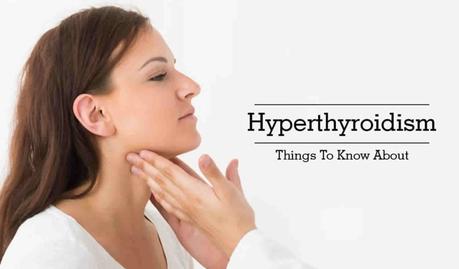
Hyperthyroidism is a diseases that occurs when the thyroid gland start making more thyroid hormone than body’s need. Hyperthyroidism is sometimes called Thyrotoxicosis. Thyroid hormones circulate throughout the body in the bloodstream and act on every tissue and cell in the body. Hyperthyroidism causes many of the body’s functions to speed up
What is the Thyroid?
The thyroid is a, butterfly-shaped gland 2-inch-long , weighing less than 1 ounce. Located in the front of the neck below the larynx, it has two lobes, one on each side of the windpipe. The thyroid is the only endocrine gland. The glands of the endocrine gland lproduce, store, and release hormones into the bloodstream. The hormones then travel through the body and direct the activity of the body’s cells.
The thyroid gland makes two thyroid hormones, triiodothyronine (T3) and thyroxin (T4). T3 is made from T4 and is the more active hormone, directly affecting the tissues.
Thyroid hormones affect metabolism, brain development, and breathing. Heart and nervous system functions, body temperature, muscle strength, skin dryness, menstrual cycles, weight, and cholesterol levels. Thyroid hormone production is regulated by thyroid-stimulating hormone (TSH), which is made by the pituitary gland in the brain. When thyroid hormone levels in the blood are low, the pituitary releases more TSH. When thyroid hormone levels are high, the pituitary responds by decreasing TSH production. TSH Pituitary gland Thyroid T3-T4 The thyroid’s production of thyroid hormones—T3 and T4—is regulated by thyroid-stimulating hormone (TSH), which is made by the pituitary gland.
What causes Hyperthyroidism?
A variety of conditions can cause hyperthyroidism. Graves’ disease, an autoimmune disorder, is the most common cause of hyperthyroidism. It causes antibodies to stimulate the thyroid to secrete too much hormone. Graves’ disease occurs more often in women than in men. It tends to run in families, which suggests a genetic link. You should tell your doctor if your relatives have had the condition.
Other causes of hyperthyroidism include:
- excess iodine, a key ingredient in T4 and T3
- thyroiditis, or inflammation of the thyroid, which causes T4 and T3 to leak out of the gland
- tumors of the ovaries or testes
- benign tumors of the thyroid or pituitary gland
- large amounts of tetraiodothyronine taken through dietary supplements or medication
What are the symptoms of hyperthyroidism?
High amounts of T4, T3, or both can cause an excessively high metabolic rate. This is called a hyper metabolic state. When in a hyper metabolic state, you may experience a rapid heart rate, elevated blood pressure, and hand tremors. You may also sweat a lot and develop a low tolerance for heat. Hyperthyroidism can cause more frequent bowel movements, weight loss, and, in women, irregular menstrual cycles.
Visibly, the thyroid gland itself can swell into a goiter, which can be either symmetrical or one-sided. Your eyes may also appear quite prominent, which is a sign of exophthalmos, a condition that’s related to Graves’ disease.
Other symptoms of hyperthyroidism include:
- increased appetite
- nervousness
- restlessness
- inability to concentrate
- weakness
- irregular Heartbeat
- difficulty sleeping
- fine, brittle hair
- itching
- hair loss
- nausea and vomiting
- breast development in men
The following symptoms require immediate medical attention:
- dizziness
- shortness of breath
- loss of consciousness
- fast, irregular heart rate
Hyperthyroidism can also cause atrial fibrillation, a dangerous arrhythmia that can lead to strokes, as well as congestive heart failure.
Who is likely to develop Hyperthyroidism?
Women are two to 10 times more likely than men to develop hyperthyroidism.
Certain factors can increase the chances of developing thyroid disorders. People may need more regular testing if they
• have had a thyroid problem before, such as goiter or thyroid surgery
• have a family history of thyroid disease
• have pernicious anemia, a B12 deficiency; type 1 diabetes; or primary adrenal insufficiency, a hormonal disorder
• eat large amounts of food containing iodine, such as kelp, or use iodinecontaining medications such as amiodarone, a heart medication
• are older than age 60
• were pregnant or delivered a baby within the past 6 months
AYURVEDIC VIEW IN HYPERTHYROIDISM
If you are seeking hypothyroidism natural treatment options then Ayurvedic remedies are well worth considering.
The Ayurvedic line of treatment for Thyroid conditions mainly includes rebalancing the doshas in the body and eliminating the diseases causing toxins or ama.
Each gland in our body plays a vital role and performs a specific function. The Thyroid gland is an endocrine gland present in the neck with two lobes connected by an isthmus. This gland in the body secretes three hormones thyroxine/T4, triiodothyronine/T3, and calcitonin. But when this thyroid gland starts producing too much of thyroxine hormone it leads to an overactive thyroid named as Hyperthyroidism.
These patients feel signs and symptoms like weight loss, irregular heartbeat, anxiety, rapid heartbeat, sweating, increased appetite, fatigue, skin thinning, brittle hair, change in menstrual pattern, muscle weakness, and tremor in hand and fingers, etc. People take allopathic treatment for hyperthyroidism but these medicines are useless as they didn’t act on the root cause of disease. Instead of these, you should start with ayurvedic medicines that will directly act on the root cause and ensure your thyroid gland not to secrete excess thyroxine hormone. Chandigarh Ayurved Centre provides a complete solution kit known as “Hyperthyroidism Care Kit” that contains four products in it.
ALL PRODUCTS DESCRIPTION IN DETAIL:

1. Thyroheal Tablets:
As the name suggests these tablets are herbal and proper solutions for your hyperthyroidism condition. These herbal tablets are prepared from the herbs like Brahmi (Bacopa monnieri), Kachnar (Bauhinia variegate), Gandir (Coleus forskohlii), & Shud Guggul (Commiphora mukul). All the herbs in combination maintain the functioning of the thyroid gland.
Recommended Dosage: Take 1 tablet twice daily with normal water.
2. Kanchnaar Guggulu:
Kanchnaar guggulu is considered as the best medicine for skin problems such as wounds, pimples, boils, etc. The tablet is composed of Kanchnaar (Bauhinia variegata), Pippali (Piper longum), Shunthi (Zingiber officinale), Guggulu (Commiphora mukul), Twak (Cinnamomum zeylanicum), etc. These tablets pacifies all the three doshas and helps in reducing the symptoms of pimples. This medicine checks and treats any kind of abnormal growth in the body, healing of ulcers, thyroid disorders, hernia, lesions and cancer. All kind of unwanted growth and fluid retentions in the body is treated by Kanchnar Guggul and it reduces all kinds of lumps in the body.
Recommended Dosage: Take 1 tablet twice daily with normal water.
3. Re-Active Powder:
This powder is made up of amazing ayurvedic herbs like shatavari, ashwagandha, museli, vadfari kand, shudh shilajit, kaunch beej etc. All these herbs help in overall detoxification of the body and builds up natural immunity, & provides energy to the body.
Recommended dose: Take 10 gm powder with a glass of milk one or twice a day.
4. Panchsakar Churna:
This is an ayurvedic remedy that is prepared from ingredients like Shunti, Haritaki, Pippali, Trivrit, and Sauvarchala lavana. It mainly acts as a Vatakaphahara. Regular use of this churna gives effective result in loss of appetite, bloating related to piles patient. It also helps in relieving the abdominal pain and Constipation very easily.
Recommended Dosage: Take 1 teaspoonful daily with warm water at bedtime.
5. Trikatu Syrup:
The main herbs used for the formation of this syrup are Marich (Piper nigrum), Pippali (Piper longum), & Shunthi (Zingiber officinale). This herbal syrup deals with the signs & symptoms related to hyperthyroid patients. It is very effective syrup for different diseases.
Recommended Dosage: Take 2 teaspoonfuls twice daily.
